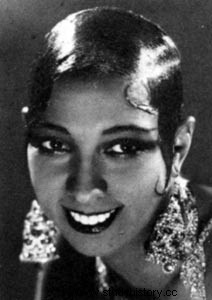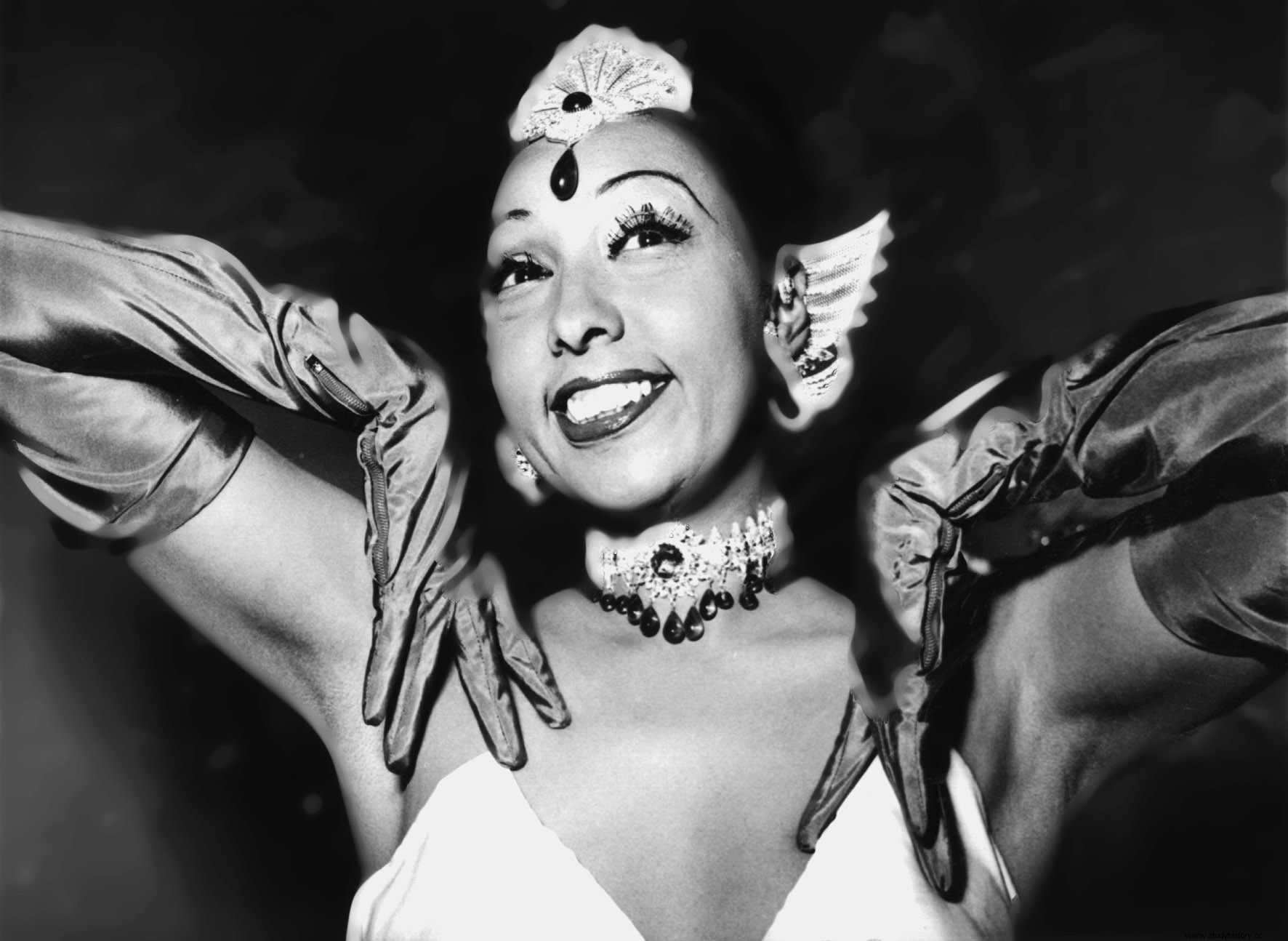Freda Josephine McDonald, known as Josephine Baker (1906 – 1975) was a singer, dancer, actress and conductor. Activist and member of the resistance during the Second World War, she was committed to the fight against racism .
An artist's childhood
 Freda Josephine Mc Donald was born on June 3, 1906 in Saint Louis, Missouri (United States ). Of mixed Afro-American and Native American origin, she is the daughter of Carrie Mac Donald and Eddie Carson. When Joséphine was only one year old, her father left her mother who remarried Arthur Martin; they will have three other children:Richard, Margaret and Willie Mae. Having to help support the family, Joséphine alternates between school and housework. At the same time, she learned to dance and in 1920 joined a trio of street artists, the Jones Family Band.
Freda Josephine Mc Donald was born on June 3, 1906 in Saint Louis, Missouri (United States ). Of mixed Afro-American and Native American origin, she is the daughter of Carrie Mac Donald and Eddie Carson. When Joséphine was only one year old, her father left her mother who remarried Arthur Martin; they will have three other children:Richard, Margaret and Willie Mae. Having to help support the family, Joséphine alternates between school and housework. At the same time, she learned to dance and in 1920 joined a trio of street artists, the Jones Family Band.
The same year, at the age of thirteen, Josephine married Willie Wells but the marriage did not last long. In 1921, she married, also for a fairly short time, Willie Baker with whom she settled. She earns her living by dancing at the Standard Theater, then goes to New York to try her luck on Broadway. For two years, she participated in the tour of the musical Shuffle Along , then dance in other shows.
The Negro Review
In 1925, Josephine Baker met Caroline Dudley Reagan, wife of the commercial attaché at the American Embassy, who asked her to take part in a show in France:the Revue nègre. Joséphine accepts and embarks for Paris. From the end of the year, she performed at the Théâtre des Champs-Elysées. Dressed in a banana loincloth in a condescending show towards blacks, she met with immediate success and aroused a new interest in jazz in France. Her career having started during her marriage to Willie Baker, she kept this name thereafter despite the brevity of this union.
In 1927, after a tour of Europe, Joséphine took the review to the Folies Bergères. She is accompanied on stage by a leopard, Chiquita, who frequently escapes into the pit, terrorizing the musicians and exciting the audience. The same year, she launched into song and cinema. Her famous song "J'ai deux amours" met with success in 1931 while the films in which she played, Zouzou and Princess Tam Tam , have less of an audience. She inspired the artists of her time, including Ernest Hemingway, F. Scott Fitzgerald, Pablo Picasso and Christian Dior. In 1934, she sang Jacques Offenbach's opera La créole and, on this occasion, works on his voice and progresses considerably in singing. In 1936, Joséphine Baker returned to the United States for a tour but she did not enjoy the same success as in Europe and came under fire from critics. She returned to France the following year, hurt by this reception. In 1937, she married Jean Lion and acquired French nationality.
The “rainbow tribe”
 In 1939, when the Second World War broke out, Josephine Baker was recruited by the Second Bureau, intelligence service of the French army. His work allows him to move frequently and transmit information without attracting attention. Thanks to her associations, she collects information from Parisian high society, mobilizes for the Red Cross and sends messages in invisible ink on her scores. In 1941, she moved to Casablanca where she fell seriously ill for many months. From 1943, she began to sing for French, British and American soldiers in North Africa. During the Liberation, she performed for soldiers and resistance fighters following the front line. After the war, his activities earned him the Croix de Guerre, the Resistance Medal and the Legion of Honor from the hands of General de Gaulle.
In 1939, when the Second World War broke out, Josephine Baker was recruited by the Second Bureau, intelligence service of the French army. His work allows him to move frequently and transmit information without attracting attention. Thanks to her associations, she collects information from Parisian high society, mobilizes for the Red Cross and sends messages in invisible ink on her scores. In 1941, she moved to Casablanca where she fell seriously ill for many months. From 1943, she began to sing for French, British and American soldiers in North Africa. During the Liberation, she performed for soldiers and resistance fighters following the front line. After the war, his activities earned him the Croix de Guerre, the Resistance Medal and the Legion of Honor from the hands of General de Gaulle.
In 1947, Joséphine Baker married Jo Bouillon and bought the Milandes estate in the Dordogne with him. Following a miscarriage, she could not have babies but, in 1949, she decided to adopt children of all origins (her "rainbow tribe") to prove that children of different religions and different ethnicities can be siblings. She thus raises two daughters and ten sons from all over the world.
The African-American Civil Rights Movement
In the 1950s, she supported the African-American Civil Rights Movement, writing articles and giving speeches to denounce racism and segregation in the United States. In 1955, she relayed the scandal in Europe with the murder of Emmet Till and the acquittal of the two murderers. In 1963, she took part in the March on Washington for work and freedom organized by Martin Luther King.; she intervenes at his side and pays tribute to the activists Rosa Parks and Daisy Bates.
Joséphine Baker continues to perform, at the Olympia in Paris in 1968, in Belgrade in 1973, at Carnegie Hall in 1973, at the Royal Variety Performance at the London Palladium in 1974, at the Gala du cirque in 1974 in Paris. In 1975, she produced a retrospective of her career, “Josephine at Bobino”.
On April 10, 1975, Josephine Baker suffered a stroke. Taken to the hospital, she died there two days later at the age of 69.
